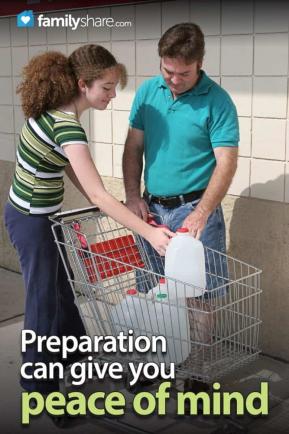
When I switched on the news and saw images of the Boston terror attacks flash across my TV screen, I couldn't help but be in awe at how such a normal day turned upside down. The city was suddenly asked to stay inside. Then, I got the strangest thoughts. I thought of the fact that there was no more milk in our fridge. If a disaster or attack happened in my city, I wouldn't have enough supplies in the house to keep us going for more than a few days - if even that long. April 16 showed no warning signs for Boston, yet the day ended in chaos. I couldn't help but wonder how I'd react in such a situation. Would I be prepared?
If you're thinking the same thing, here are four easy steps that you can take in preparing for any calamity or disaster. Preparation is everything.
With food storage, every little bit will help
It's so easy to get overwhelmed when thinking about food storage. Often, many of us feel like in one day we should collect enough cans of soup to last us through another world war. This isn't the case. No matter what your budget, or your busy schedule, looks like, saving up food storage is a gradual process. Each time you grocery shop, grab extra cans of soup or vegetables, or grab an extra roll of toilet paper and a pack of instant potatoes. Grabbing little things here and there won't hurt the pocket book, but it'll stock your emergency cupboards in no time. Make sure that everything you buy for food storage is non-perishable and something that will be easy to make or eat without much preparation.
The three-day kit
According to ready.gov, a national disaster preparedness website, packing a three-day emergency kit is crucial to preparing for any disaster. Every person in your household should have a kit of their own in a backpack or easy-to-carry duffel bag. Some things to include in these packs are:
-
Three gallons of water per person
-
Non-perishable foods (granola bars, soups, etc.)
-
Extra cell phone, flashlight, and radio with extra batteries
-
Dust mask, whistle, duct tape, pliers and moist towelettes
-
Local area maps
-
Unique needs (such as inhalers and medications)
Family emergency plan
It's important that you and your family lay out a solid emergency plan. Your emergency plan should include your emergency contacts and a location where everyone would meet if a situation ever arises while the family is apart. Make sure your children know who they can stay with, important numbers, and steps to take so that they can stay safe and out of harm's way.
Inform yourself
The best way to be prepared is to stay informed about what's going on in the world and in your community. Familiarize yourself with nearby community centers and emergency response teams and remember that it is best to expect the best, but be prepared for whatever comes. Preparation will help you take care of your family in every situation and will bring great peace of mind.

